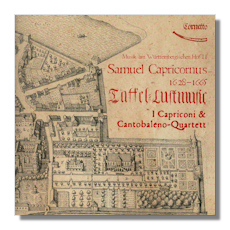
The Internet's Premier Classical Music Source
Related Links
- Capricornus Reviews
- Latest Reviews
- More Reviews
-
By Composer
-
Collections
DVD & Blu-ray
Books
Concert Reviews
Articles/Interviews
Software
Audio
Search Amazon
Recommended Links
Site News
 CD Review
CD Review
Samuel Capricornus

Taffel-Lustmusik
- Bartholomäus
- Castiri pom
- Cupido
- Die schöne Venus
- Ihr freundlichen Blicke
- O quanti labores
- Per belli potatores
- Sonata à 3 #1
- Sonata à 3 #2
- Sonata à 3 #3
- Sonata à 3 #4
- Sonata à 3 #5
- Sonata à 3 #6
Jean-Marie Tricoteaux, organ
I Capricorni
Cantobaleno-Quartett
Cornetto COR10029
Samuel Capricornus' short life (he died at the age of 37 in 1665) was a successful one musically: he eventually became Hofkapellmeister in Stuttgart and his music was widely popular. It gained mentions in seventeenth century cities as far apart as Oxford and Krakow. It's estimated that the 100 works known to exist in manuscript (17 in published score) are only a fifth of those he wrote. Capricornus' life itself was full and eventful with travels and musical positions throughout eastern Europe; he studied theology, philosophy, and Latin. Indeed, his output included concerti, masses, instrumental music, secular vocal music, ballets and operas. It's his sacred vocal music that has mostly survived.
For all Capricornus' obvious talent and originality, there are but two other CDs in the current catalog wholly devoted to his work – with the Lukas Barock Ensemble (Cornetto-verlag 10014) and his Leçons De Ténèbres by La Chapelle Rhénane (K617 617188). So this with I Capricorni and Cantobaleno-Quartett from Cornetto is a particularly welcome release. Capricornus worked in the tradition, if not always the idiom, of Schütz. He too blended the Italian concertante style with the German motet. The result is colorful – as is evident from the panache and vibrancy which I Capricorni and Cantobaleno-Quartett bring to this set of a dozen or so pieces on this CD from Cornetto. I Capricorni is an original instrument ensemble of friends who, apparently, have come together specifically for this recording; it consists of five strings and organ. Cantobaleno is a quartet more formally founded (in 2001). Given what could have been a bit of an ad hoc arrangement, the style and polish of everyone involved in this music-making is extremely pleasing and satisfying. There is just enough of a sense of down-to-earth realism and professional poise in the way they play and sing to make their engagement with the music a real delight.
The music is full of contrast, variety, life and exuberance without being either strident or in any way outlandish. One senses that Capricornus was able to step down from taking himself and his compositional tasks too seriously, although we know that – like Bach – whose way he was marginally responsible for preparing, he was at odds with, for example, the organist at the Stiftskirche. What's more, several of the works presented here employ comic (some of it quite risqué) and onomatopoeic language as well as animal noises and so on. Per belli potatores [tr.4] and Castiri pom [tr.6] have parts of words repeated for their effect and strange sound. Bartholomäus [tr.8] has what sound like multiple creatures… certainly some very well-trained bees. If anything, the singers mercifully underplay the potential for silliness which is there.
But this composer's music is not trite, nor superficial. Indeed, there are some moments of great subtlety and tenderness. O quanti labores [tr.10], for instance, is gentle, quiet and almost introspective. The way it's sung and accompanied is indicative of the sensitive and idiomatic performances which I Capricorni and Cantobaleno-Quartett have given here. They take the music completely at face value during these serious works just as much as they wryly underpin the jocularity in the more extrovert ones. But without ever drawing undue attention to whichever feeling Capricornus intended. The balance between types of music, tempi and instrumental/vocal color and alternation adds to our enjoyment. That Capricornus wrote what at times is simple and singularly transparent music such as the Sonata 6 à 3 [tr.12] offers the performers as much of an opportunity to relax and play for the pleasure of it as does Die schöne Venus [tr.13] to enter into the more intense and concentrated world of a lyrical mythological vignette. Once again, both players and singers perform from the heart of the music without ever losing the grace and detachment that would come from an over declamatory delivery. Very impressive; and all the more so for the performances' immediacy.
After sampling what Capricornus is capable of, it's nice to know that much other music by the composer exists, although scattered in uncollected manuscript throughout various places in Europe. While not so profound nor wholly satisfying, perhaps, as that of Schütz, Capricornus' music certainly repays attention. This well-focused CD on the Cornetto label should help argue his case and provide much exciting and stimulating listening. The acoustic favors the music with a positive balance between singers and instrumentalists. The liner notes are slim and rather poorly laid out and inadequately proof-read but have the texts in Latin/German and English translation as well as small pictures illustrating Capricornus' life, and the Cantobaleno-Quartett. Well worth a look with much more than curiosity value.
Copyright © 2011, Mark Sealey.





















